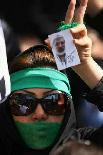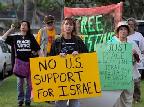Alan Dershowitz has suggested that to be effective Israeli propaganda should support 80 percent of what Israel does, and be critical of the other 20 percent. So I expected that Dershowitz would only approve 80% of the Israeli killings on the Gaza flotilla, while expressing some mild criticism regarding the IDF’s other victims. Silly me.
Green Is the New Green: Social Media and the Post-Election Crisis in Iran, 2009

The Persian language blogosphere is rich, varied, and dynamic. Of the 100 million blogs registered around the world in 2005, 700,000 were Persian language, either inside Iran or in the diaspora. Of these, over 60,000 are updated frequently. With over 20 million Iranians connecting to the internet, and over 600,000 Iranians signed up on Facebook by the presidential election of the summer of 2009, the Iranian cyber community is by far the most dynamic such community in the Middle East, and one that is unambiguously diverse.
Iran: Reform and Revolution
Recent news about Iran has been dominated by U.S. attempts to increase sanctions, and one could be forgiven for thinking the world hegemonic capitalist power is preparing war against a major nuclear power. The reality is far different: all the fuss is about a country where nine months of mass protests have not only weakened the state but also divided the ruling circles, making reconciliation at the top impossible.
Revolutionary Prefigurations: The Green Movement, Critical Solidarity, and the Struggle for Iran's Future
A year has now passed since the explosive appearance of Iran’s Green movement in June 2009. Suspecting malfeasance in the official tally of the country’s June 12 presidential election, millions of Iranians took to the streets. The historian Ervand Abrahamian, author of the classic Iran Between Two Revolutions, described the silent rally of June 15 at Azadi (Freedom) Square in Tehran (London Review of Books, 7/23/09):
Palling Around with Terrorists: Obama and the Israel-Palestine Conflict

During the 2008 presidential campaign, Barack Obama was accused of palling around with terrorists.
This Republican canard was focused on the former Weatherperson, Bill Ayers, but also on Rashid Khalidi, the respected Palestinian-American scholar who had been a friend of Obama’s in Chicago.
Questions for the Peace Movement: The U.S. Occupation of Iraq
This article is part of an ongoing discussion of the Iraq war and its aftermath. Various New Politics editors will be writing on this subject in future issues, not always with identical viewpoints, and we welcome contributions from our readers.
Revisiting Foucault and the Iranian Revolution
February 2004 marked the twenty-fifth anniversary of the Iranian Revolution. From September 1978 to February 1979, in the course of a massive urban revolution with millions of participants, the Iranian people toppled the regime of Muhammad Reza Shah Pahlavi (1941-1979), which had pursued a highly authoritarian program of economic and cultural modernization. By late 1978, the Islamist faction led by Ayatollah Ruhollah Khomeini had come to dominate the antiregime uprising, in which secular nationalists, democrats, and leftists also participated.
Open Letter of Solidarity with Egyptian Workers from the Campaign for Peace and Democracy, April 30, 2020
We are writing to extend our heartfelt solidarity and support to you, Egyptian workers, who in recent months have been courageously demanding that your government address your desperate economic conditions. The American press has been shamefully muted about the grim economic and political realities of life for people in Egypt, a key strategic U.S. ally in the Middle East.
Unraveling Iraq: The Sociopolitical and Ethical Dimensions of Resistance
Iraq, as one long conversant in its fervent political history remarked to me, is much like the earth resting underneath a giant rock laid there for a very long time. The U.S.-led invasion of 2003 destabilized — if not moved — this rock and unleashed a multitude of organisms that were unknown even to local residents.
Addicted to war
Kathryn Bigelow, the director of The Hurt Locker, claims that many men in Iraq and Afghanistan are addicted to war. If this is true, could it have something to do with the fact that GIs today do not face the endless bombardment from airplanes, field artillery, and tanks that World War II soldiers did?
I served in the 88th Infantry Division in Italy and I never met anyone so addicted. Had we met someone like that we would have considered him “Section 8,” that is, seriously disturbed.
Does that mean that many gung-ho GIs now serving in Iraq and Afghanistan are Section 8?
The Antiwar Movement and Iraq
The antiwar movement needs to demand the immediate withdrawal of U.S. troops and an end to the U.S. domination of Iraq, not because we don't care about Iraqis, but precisely because we do care. And while we support any people's right to resistance, we should not "support the Iraq resistance."
Out Now!
No Blank Checks
Barry Finger, Wadood Hamad, and Glenn Perusek all appear to demand the immediate withdrawal of United States forces from Iraq. (Finger, 26: "we demand an immediate withdrawal of occupation forces"; Hamad, 34: "We must demand a timely schedule for the withdrawal of occupation forces from Iraq over a fixed, limited period").
Immediate U.S. Withdrawal and the Hope for Democracy in Iraq
The peace movement should call for the immediate, unconditional withdrawal of all U.S. troops from Iraq and the closing of all military bases there: no temporizing, no negotiations, no timetables — just bring the troops home, now. Peace activists should say to the American people that the occupation is part and parcel of an imperial U.S.
Iraq and the Idea of Freedom
Wadood Hamad is correct that many today are "stuck between two inadequate visions" — either apologizing for U.S. imperialist actions or "cheering any misguided ‘apparent' resistance to imperialism." Avoiding these false alternatives is not only needed to develop a successful antiwar movement; it is needed to ensure that the idea of freedom is not forsaken by today's radicals.
Struggling for Progress, in Iraq!
The current armed insurgency in Iraq, erroneously portrayed by some as "resistance" to U.S. occupation, does not — nor could it ever — represent a national resistance movement. While it is true that the medley of insurgents espouses "a mixture of Islamic and Pan-Arab ideas," it is inaccurate to insinuate that they "agree on the need to put an end to U.S. presence in Iraq."[1] For if this were true, why are those elements not fighting U.S.
The Resistance and the Antiwar Movement
The key challenge for the left today remains that of ending the occupation of Iraq, which did not end with the January 30 elections. A majority of people in the United States now thinks the invasion of Iraq was not worth the high price that has been paid as a consequence. Yet an enormous gap exists between this sentiment and the level of political activity against the occupation.
Getting Out of Iraq
[Editors' Note: The article "On John Murtha's Position" is reprinted here from ZNet, Nov. 21, 2005, followed by a postscript written especially for New Politics.]
On John Murtha's Position
'Bows of pseudo-profundity' and 'moral certitude': Alan Johnson and Democratiya
The merger of the online journal Democratiya, with Dissent, provides an obvious point to begin assessing the role of Alan Johnson’s creation. The following is not intended as the last word on this subject, but as a contribution to a process of analysis. The approach here will be to focus on the argumentation used in Democratiya, specifically in the one article written for the journal by Johnson.
